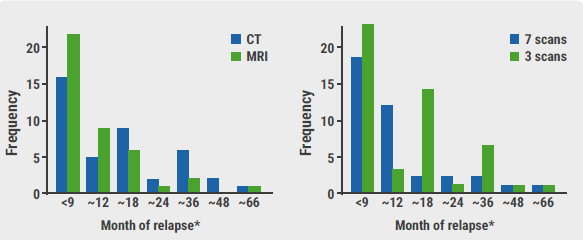Neither treatment affected global health-related quality of life (HRQoL), "and at 24 months, no clinically relevant differences in urinary and bowel symptoms persisted," Dr. Liselotte Boeve of OLVG hospital in Amsterdam and colleagues report in European Urology.
The HORRAD trial, which ran from 2004 to 2014, found improved survival for patients with primary bone mPCa who received EBRT along with ADT. Study participants completed two validated questionnaires measuring HRQoL, one specific to cancer and one to prostate cancer, at baseline and at three, six, 12 and 24 months. The authors defined a clinically significant difference as a change of 10 points or more.
At three months, patients who received radiotherapy reported significantly more diarrhea (10.8-point difference between groups), bowel symptoms (4.5-point difference) and urinary symptoms (11.9-point difference).
Forty-four percent of those who received EBRT said their urinary symptoms had worsened by 10 points or more, and 15% reported worsening bowel symptoms. None of the patients who didn't receive RT developed urinary or bowel symptoms. At 24 months, there was an 8.0-point difference between the groups in bowel symptom scores.
The European Association of Urology recently revised its guidelines to recommend prostate radiotherapy along with ADT in low-volume mPCa, the authors note.
"The results presented here are therefore important for shared decision making to properly inform patients about the choices of palliative treatments," they write. "Owing to the relatively mild and transient side effects of local radiotherapy in patients with metastatic disease, combined by a statistically significant improvement in overall survival, addition of EBRT to ADT is a well-balanced treatment option."
Dr. Trevor Royce of the University of North Carolina at Chapel Hill, who co-authored a linked editorial, said the findings "will really help maximize informed patient decision making because quality of life is so important in prostate cancer."
"The addition of radiation doesn't clearly make quality of life worse," he told Reuters Health by phone.
While the findings did not show that HRQoL was improved with radiation therapy, Dr. Royce noted, limitations of the study, including the low response rate at two years, mean the possibility can't be ruled out.
He and his colleagues conclude: "Localized treatments that reduce systemic cancer progression may also result in a measurable long-term QoL benefit, and we hope that future clinical trials will be designed to fully assess this."
Dr. Boeve was not available for an interview by press time.
By Anne Harding
SOURCE: https://bit.ly/2HIUmSl and https://bit.ly/30rVrER European Urology, online September 22, 2020.
Posted on
Previous Article
« Benign breast disease detected after baseline mammogram most apt to become cancer Next Article
COVID-19-associated delays in aortic-valve replacement tied to worse outcomes »
« Benign breast disease detected after baseline mammogram most apt to become cancer Next Article
COVID-19-associated delays in aortic-valve replacement tied to worse outcomes »
© 2024 Medicom Medical Publishers. All rights reserved. Terms and Conditions | Privacy Policy
HEAD OFFICE
Laarderhoogtweg 25
1101 EB Amsterdam
The Netherlands
T: +31 85 4012 560
E: publishers@medicom-publishers.com


